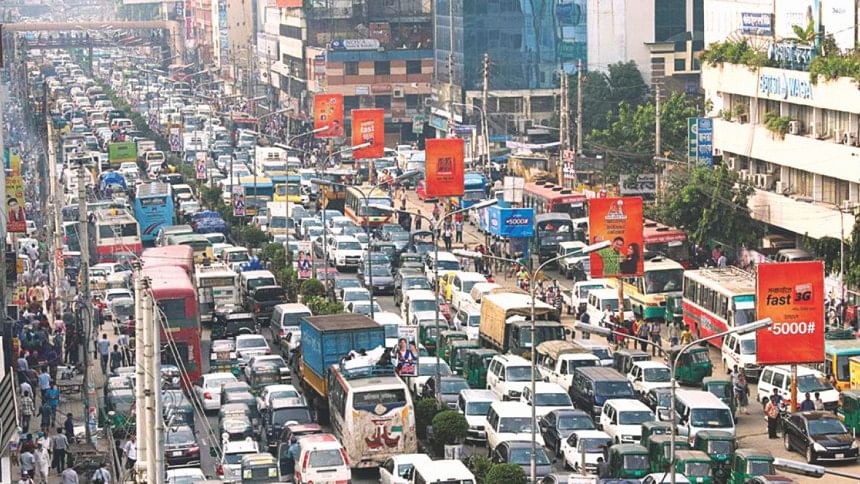Voluntarism now, educating the children

This city has arguably never before been in the grip of such treacherous traffic jam as in the past few weeks. Four hours from Joydebpur Chaurasta to Dhanmandi, two hours from Paltan to Maghbazaar, one hour on the Mahakhali Flyover, narrated some of the more contented commuters, whether by private car or by public transport or those who chose to walk.
Not that this is the only city in the world that suffers from such a horrendous malady, but our hopes were flying high with the soaring of highways over traditional roads, over rail tracks and other urban nonsenses. While we have been delighted by jetting over teeming millions and more vehicles from Palashi to Jatrabari in under ten minutes, the same has not been said about the hump that crosses the Mahakhali railway tracks.
We are erecting towers, but no stable for our horses. Basements earmarked for cars have become everything but car parks, and have taken on exotic names of establishments from which run aroma of every dish on earth from chicken jhaal farazi to pizza to Sichuan soup. The pavements have been taken over by an overspill of parked vehicles, and errant motorcyclists have not been cowed down by a court order.
Shops, workshops, restaurants and latrines have been occupying pedestrian-ways for long. Better business (except for the last mentioned) and acceptance (read surrender) of the neighbourhood have encouraged enterprises to encroach on the vehicular roads, not without the patronage of local politics, which has more to do with community mastani, where all shades of politicians drink from the same stream. Then, suddenly, one fine morning when we are unable to reach our child for an important exam, or a patient is enduring the endless cacophony the ambulance siren wailing in vain, we wonder why our roads have become congested.

Planning has not been the forte of the planners (include all out-of-line politicians, professionals and bureaucrats) of pre- and post-independence Dhaka. In the late 1960s, it suffered the antagonism of the departing rulers, who stopped thinking about it from 1952 when it sensed the naissance of Bangalee nationalism. Since 1971, for a good part of our existence, the city has been the unwitting (I hope) victim of poor technical judgement, of lack of aspiration to learn from good practices abroad and bad ones at home, and of sheer arrogance that the person-in-charge (political, administrative or technical) knows everything, even in the minuscular stratum of our upazilas, but also of the determination of a large number of the citizenry (that includes you and me) to flout planning, building and public amenities rules that were framed to govern us for our collective wellbeing.
We lost our ponds to earth-filling. Some of our waterways have given way to motorways. Planned open spaces, perhaps meant for sports and recreation, have been covered by building blocks. The only openness is the street on which we expect to continue producing world-class cricketers. Our children have fallen to death from rooftops not by their choice, but because their playing fields had met death much earlier.
From the most densely-populated Manila (43,000 people per sq.km) to cities in US (Union City, New Jersey), and Greece (Neapoli), Dhaka ranks 29th in the world with a little under 20,000, but the public service systems are working in most of those cities;
Seoul for example is a couple of thousand less with over 17,000 per sq.km. Population therefore is not the primary reason why this burgeoning city, unless injected by some quick doses of revitalisation, is on its way to self-immolation.
The first pledge for us to take is that we will be self-disciplined when it comes to abiding by rules, be it of a simple red traffic light or a setback requirement that restricts my building to a certain distance from my site boundary or of the need to provide a particular number of car parking in my property. No one else is following the rules is an excuse to break the rules. In history, it has always been great individuals, not the mass, who have changed a society, gifted a country, impacted on an entire civilisation, and swayed the mass.
While our personal contributions will go some distance in salvaging our self-respect, to get long-term returns we have to restart from the beginning. Let our children build for them their future for we have failed them bitterly. Primary school curriculum should include lessons on the importance of discipline, truthfulness, and abiding by rules, yes simple rules of living, building, shopping, driving, waste disposal and even playing. They will be the teachers of tomorrow. If they will detest us for getting our act wrong, they will at least thank us for giving them a head start. Will it not be too late for them? Only those who will want to continue leading the life of a lawbreaker will answer in the affirmative.
Architect Tanwir Nawaz's U-loops for smoother traffic movement, Architect Dr. Nasreen Hossain's need for open areas as preparedness for urban extreme events, and Architect couple Md. Tarek Haider & Moushumi Ahmed's conditions for energy-efficient buildings will bear fruition if we are voluntarily systematic and law-abiding.
Life is not a fairy tale. No modern ruler, even if democratic practice abhors such expressions, has the magic wand that can transform a pigsty into a paradise without the wholehearted, sincere and dedicated efforts and participation of the people.
The author is a practising architect at BashaBari Ltd. He is also a Commonwealth Scholar and a Fellow to the UK, a Baden-Powell Fellow Scout Leader, and a Major Donor Rotarian.

 For all latest news, follow The Daily Star's Google News channel.
For all latest news, follow The Daily Star's Google News channel. 



Comments